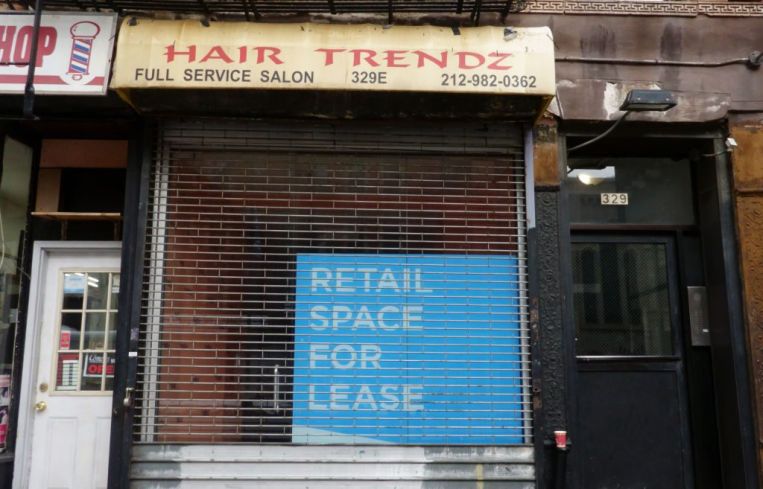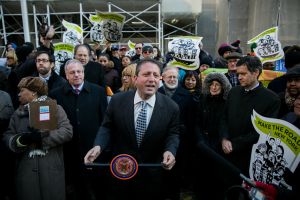Commercial Rent Control Proposed Again as NYC Retail Reels From Pandemic
By Celia Young September 16, 2021 2:50 pm
reprints
A proposal to set up commercial rent control around New York City has come back after nearly two years, as the city’s retail market reels from the COVID pandemic and record high availability rates.
The bill, first introduced by city Councilmember Stephen Levin in 2019, will finally get its day before the New York City Council’s Committee on Small Business on Friday.
The legislation would establish a board that caps rent increases for small retail, manufacturing and office space for non-chain businesses across the five boroughs, similar to how the state regulates rent-controlled apartments.
It would protect non-chain retail outposts and professional services or offices of 10,000 square feet or less, along with manufacturing businesses of 25,000 square feet or less, from exorbitant rent hikes, proponents said.
“I believe it’s in the interest of New York City, and our economy and our neighborhoods, to balance those interests better — to provide some stability for small businesses, so they can invest for the long term,” Council Member Brad Lander, a co-sponsor of the bill, told Commercial Observer. “Landlords will be able to get an increase every year, but they can’t simply displace a tenant at the end of their lease in order to double the rent.”
But the world has changed significantly since the bill was introduced in 2019. The retail availability rate in Manhattan hit a 10-year high at 28 percent, according to a report from brokerage firm JLL. Average commercial asking rents declined in 16 of 17 Manhattan retail corridors this spring compared to the previous year, according to a report from the Real Estate Board of New York.
Only four of those 17 corridors saw average asking rents stay the same or increase, compared to fall 2020 numbers. Fifth Avenue, from 49th to 59th streets, saw a 15 percent increase in average asking rents. West 34th Street, from 5th to 7th avenues, saw an 11 percent increase in average asking rents, compared to fall 2020.
Lander said the bill will be more of a boon to neighborhood retail corridors that have seen rents stay consistent or rise during the pandemic. In more residential Brooklyn areas, 12 of 17 retail corridors saw year-over-year declines in asking rents in winter 2020, the last available figures, with six seeing increases in average asking rents since summer 2020, according to a REBNY report.
Compared to Manhattan, Brooklyn’s retail rents were more resilient, with the highest seasonal increase at 20 percent and largest year-over-year increase at 10 percent, while Manhattan saw its highest seasonal increase at 15 percent with no corridor seeing a year-over-year increase. (Brooklyn’s average rents are far lower than Manhattan.)
But the law would affect more than just the few corridors that posted average rent increases, making it ill-fitted for the retail market today, said REBNY’s Senior Vice President of Planning, Basha Gerhards. Asking rents have fallen throughout the city, and Gerhards raised the concern that tax revenues would decline because landlords are making less money off of rent.
“I think [rent] is a very neat, clean thing to blame for business failure versus looking at all these other things that contribute,” said Gerhards. “If you’re in business for 30 years and you were not able to [make] a website to sell your products during the pandemic, that’s kind of it and it’s almost irrelevant how much the rent is … People love their local places, but people are still buying from Amazon.”
But, Lander said there’s no guarantee that small businesses can stay alive, even if they become profitable under the terms of their original lease, as landlords prioritizing profits can jack up their rents to an untenable amount. With more stability, retail owners could focus on growing their business, rather than struggling to survive future rent increases, he added.

“Property owners would like to preserve the right to charge whatever they can get, irrespective of providing stability to small businesses who are investing their money and hard work, blood, sweat and tears in their businesses,” Lander told CO. “This doesn’t require the donors to charge less in rent … They can increase it each year, to balance the interests of the owners.”
The proposal would establish a board of nine members appointed by the mayor that would include members representing non-chain commercial tenants, commercial landlords and members of the public with experience in real estate, community development, economics or finance, according to the text of the legislation. The board, whose members would serve two-year terms, would determine the maximum rent for commercial spaces it governs, after a series of public hearings on July 1.
Storefronts already occupied when the bill is passed would be subject to the caps under the tenants’ current rent, while ones vacant after the bill passes would use the terms negotiated during a lease as the basis for future increases set by the board.
Lander added that it’s important to preserve the city’s small businesses as they add value to communities and draw people into neighborhoods.
“If you’re a landlord and your ability to rent has doubled over the last five years, it’s not because of something you did,” Lander said. “It’s because of a broader set of changes going on that, often, small businesses in the neighborhood have done much more to contribute to the property owners.”
The rule would not apply to chain stores, though it was unclear if local owners of franchised stores would qualify for rent regulation under the rule. In 2020, more than 1,000 chain stores across the city closed, with the overall number of chains in the Big Apple declining by 12.8 percent, according to the Center for an Urban Future.
The legislation would also collect an annual $100 tax from property owners of commercial spaces affected by the new rent regulation to pay for the administration of the law, which is different than rent-controlled and stabilized apartments, where the city collects a fee from market-rate property owners to pay for the administration of the Rent Guidelines Board, according to the New York State Division of Housing and Community Renewal.
The bill has 22 co-sponsors in the city council, Lander said. If passed by the committee, it would be up to Council Speaker Corey Johnson to bring it to a hearing in front of the full city council and eventually call a vote on it, needing at least 26 members’ approval to pass.
Then, it would need to be signed into law by Mayor Bill de Blasio, who has only publicly said he was looking into the bill. Johnson and de Blasio did not respond to requests for comment. Plus, Johnson, de Blasio and many of the proponents of the law will be term-limited out of office come the end of the year, leaving its future in the air. Eric Adams, likely the city’s next mayor, did not respond to a request for comment on his thoughts on the law.
But, despite that, the bill continues to face fierce pushback from landlords and property owners over its legality and consequences. Some argue it’s unclear if the city even has the legal authority to enact it.
“New York state is the ultimate sovereign,” said Alexander Lycoyannis, a lawyer with Rosenberg & Estis. “The power to independently enact rent regulation is not a power that’s been delegated to New York City or any other local government under the state constitution and a number of cases have held that over the years.”
While the state constitution authorizes local government the ability to enact laws in connection with “property affairs and government,” courts have tended to find that rent control should be left to the state, said Lycoyannis.
“Whoever signs that bill, I think the lawsuit is going to be filed before the ink is dry on the paper,” he said. “There will be there will be a rush to the courthouse.”
The state enacted a form of commercial rent control from 1945 to 1963 after tenants complained of excessive rents and evictions after the Second World War, which stopped rent increases unless a landlord and tenant had a written agreement by way of an arbitration process or by court order.
City officials pushed for it to return in the 1980s after small businesses, faced with huge rent increases, kept closing up shop. That bill, the Small Business Jobs Survival Act, which set up an arbitration process for lease renewals, was introduced in 1986 and bounced around for years, most recently getting a hearing in 2018.
Lycoyannis questioned the need for rent regulation to return, given the pandemic’s effect on commercial rents.
“Right now, in the city, rents have been falling,” Lycoyannis said. “Commercial rents have been absolutely decimated over the last two years … There’s no logical rationale as to why we should do this now. It’s just an idea that is absolutely mismatched to the situation we are currently in.”
Celia Young can be reached at cyoung@commercialobserver.com.



